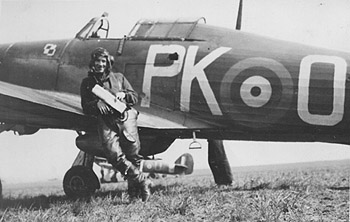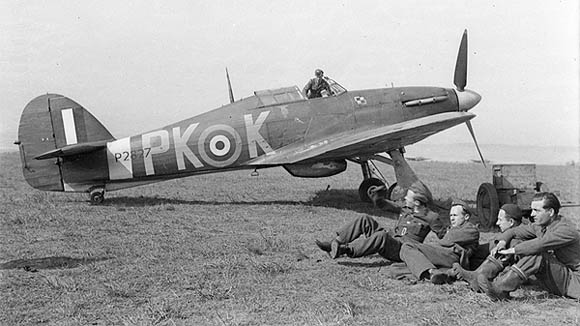|
On 8 January 1941, Air Ministry approved formation of another
Polish fighter squadron at RAF Station Ackilngton
(Northumberland), 15 Group, located 25 miles N of Newcastle. No.
315 and code letters "PK" were assigned to it. As a British
advisor, S/Ldr H.D. Cooke became its commander with F/Lt Davy and F/Lt
Edy commanding the Flight A and B respectively.
The Polish Air Force Inspectorate issued an order for F/Lt Pietraszkiewicz
from No 307 (Polish) Squadron to take command of this newly form unit, promoting him to the
rank of a Squadron Leader at the same time. Technical Officer,
F/Lt Jurand and Intelligence Officer, P/O Narkiewicz, in
cooperation with K.W.Fo.2 in Blackpool, assisted him in
recruiting the personnel. On January 21st, S/Ldr Pietraszkiewicz
came to Acklington. This date became officially the day the
squadron was formed. In a next few days all the personnel came to
the station.
Most of the pilots and ground crew were from the
Szkola
Podchorazych Lotnictwa in Deblin, which was a hatchery for many
excellent Polish pilots. That's why on 9 September 1941, Gen Sikorski, Head of the Polish Armed Forces, gave squadron the
name: "Deblinski" or "City of Deblin". In its
beginning, 315 Squadron formed :
S/Ldr Stanislaw
Pietraszkiewicz Commander (307)
F/Lt Wladyslaw Szczesniewski Flight A Commander (245)
F/Lt Wladyslaw Szulkowski Flight B Commander (65)
Sgt Jan Adamiak (302)
P/O Jozef Czachowski (Blackpool)
F/O Zbigniew Czaykowski (303)
P/O Jerzy Czerniak (302)
P/O Eugeniusz Fiedorczuk (303)
F/O Bernard Groszewski (43)
P/O Wladyslaw Grudzinski (308)
P/O Tadeusz Hoyden (308)
Sgt Josef Kania (Czech, 303)
P/O Franciszek Kornicki (303)
Sgt Jan Kowalski (303)
Sgt Tadeusz Krieger (308)
P/O Marian Lukaszewicz (Blackpool)
P/O Wlodziemierz Miksa (303)
P/O Tadeusz Nowak (253)
Sgt Edward Paterek (303)
F/O Marian Pisarek (303)
Sgt Marek Slonski (306)
Sgt Boleslaw Turzanski (306)
P/O Kazimierz Wolinski (306)
Sgt Piotr Zaniewski (308)
(in brackets, pilot's posting
prior to 315)

S/Ldr Pietraszkiewicz at RAF Speke.

F/Lt Jordan became squadron's adjutant, F/Lt Luranc its
technical officer and F/O Jarosz its doctor. On February 3, squadron received its first a/c, Hurricane
MkI (L1740), followed by several others in a next few days.
Squadron's first training flights started on February 8th. There were many
problems with newly arrived aircraft, which needed a lot attention and the
ground personnel was lacking in number. The area received quite a bit of
snowfall what further hindered training. On
this type of a/c - Hurricane MkI - the squadron flew till 14 July 1941.
On March 7th, the Polish Color was raised at Acklington
Station and the ceremony was attended by the personnel of 315 and 317 Squadron,
which was forming up at the same time.
Right: F/Lt Luranc.
Many of the squadron's ground personnel were very
competent and apt people. Most had tons of experience brought from working with
aircraft in Poland and France. They needed only a short (usually three month)
course in British equipment prior to posting to operational units. One of those
was Antoni Mackowski, who became the 315's chief armourer. He recalls:
"... From Wheeton I was posted to No 315 Squadron at
Acklington. Each section had its British advisors what helped us to break in. On
a second day they issued us overalls and toolboxes, and we immediately went to
our Hurricanes dispersed at airfield. Fitters were already buzzing around them.
Aircraft stood on grass and theirs Brownings were in a bad shape. A lot of parts
were even rusted. We started with daily inspection under RAF700 Schedule. After
half a day of work machine guns were like new with a nice luster on them ...
... In a beginning of March the squadron transferred to Speke
near Liverpool where it patrolled over convoys. As armourers we did not have
much to do, since our aircraft very rarely met the enemy. We weren't idle
either. Every two hours we had to change six-cartridge color flares, which were
used to signal friendly in aircraft to convoy escort. Till the middle of the
May, Liverpool was regularly heavily bombed at night and the noise made it
difficult to sleep. Yet in the morning everybody had to be in good shape to do
the hard work ..."

Group of 315th ground personnel welcome a moment of
free time and springtime sunshine.
|


